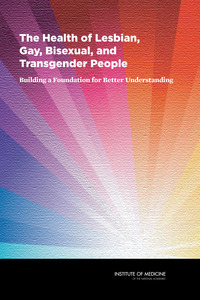By ROBERT PEAR Published: March 31, 2011, reposted at http://www.keystothecloset.blogger.com/
WASHINGTON — The federal government should systematically collect demographic data on gay, lesbian and transgender people and should conduct biomedical research to understand why they are more likely to have certain chronic conditions, the National Academy of Sciences said Thursday.
In a report requested by the National Institutes of Health, the academy proposed an ambitious research agenda to investigate the prevalence and causes of obesity, depression, cancer, heart disease and other conditions among gay people.
Federal officials had asked the academy’s Institute of Medicine to identify gaps in research on the health of gay Americans. Dr. Robert O. Graham, the chairman of the panel that did the study, said that was impossible.
“The available evidence on the health of lesbian, gay, bisexual and transgender people is sparse,” said Dr. Graham, a professor of family medicine at the University of Cincinnati. “Researchers need to do much more than simply filling gaps.”
The panel, appointed by the Institute of Medicine, said the government should finance research to develop standardized measures of sexual orientation and gender identity — “one’s basic sense of being a man, woman or other gender, such as transgender.”
Gay people often face “barriers to equitable health care,” decline to seek care in times of need and receive substandard care when they seek it, the report said.
“Fearing discrimination and prejudice,” it said, “many lesbian, gay, bisexual and transgender people refrain from disclosing their sexual orientation or gender identity to researchers and health care providers.”
In addition, the report said, many doctors lack the necessary training. “Medical schools teach very little about sexuality in general and little or nothing about the unique aspects of lesbian, gay and bisexual health,” it said.
The panel said the National Institutes of Health should strongly encourage researchers to include “sexual and gender minorities” in studies whenever possible, just as they include women, blacks, Asian-Americans and Hispanics.
In its report, which offers a comprehensive survey of information about the health of gay Americans, the panel made these points:
· “On average, men tend to show greater interest in sex and express a desire to engage in sex more frequently than women. These patterns appear to occur in both heterosexual and homosexual populations.”
· Gay youths and adults are typically well adjusted and mentally healthy, but some research indicates that they are more likely to be depressed, have suicidal thoughts and attempt suicide.
· “Lesbians and bisexual women may be at higher risk for breast cancer than heterosexual women.”
· Some studies suggest that long-term use of hormone therapy by transgender people may increase their risk for cancer, but more research is needed.
· In addition, the report said, “Some research suggests that lesbians and bisexual women have a higher risk of obesity than heterosexual females.” Lesbians may also have higher rates of smoking and alcohol consumption than heterosexual women, it said.
A version of this article appeared in print on April 1, 2011, on page A16 of the New York
http://www.nytimes.com/2011/04/01/health/policy/01gays.html?_r=1&ref=research



 by Scout, PhDNetwork DirectorOp-ed by Scout Crossposted from the Washington Blade: “
by Scout, PhDNetwork DirectorOp-ed by Scout Crossposted from the Washington Blade: “